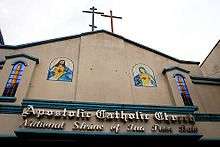Apostolic Catholic Church (Philippines)
Apostolic Catholic Church | |
|---|---|
 National Shrine of Ina Poon Bato, Quezon City | |
| Classification | Catholic |
| Orientation | Apostolic and Paleo-orthodox |
| Polity | Episcopal |
| Patriarch | John Florentine L. Teruel[1] |
| Associations |
National Council of Churches in the Philippines[2] Canadian Council of Churches |
| Region | Philippines and Canada |
| Language | Filipino and English |
| Founder | John Florentine L. Teruel and Maria Virginia Peñaflor Leonzon[1] |
| Origin |
July 7, 1992[1] |
| Separated from | Roman Catholic Church |
| Official website | http://nsipb.com/ |
The Apostolic Catholic Church (ACC) is an independent Catholic church founded by John Florentine L. Teruel in 1992 in the Philippines.[1] The ACC traces its faith and worship from the One, Holy, Catholic and Apostolic Church that Jesus Christ and his apostles established, and claims 24 lines of apostolic succession.
The church's goal is to mediate and unite the Western Rite or the Roman Catholic Church, and the Eastern Rite or the Eastern Orthodox Church to form a single Catholic church. The Apostolic Catholic Church has been classified as an independent and autocephalous Catholic institution because it is not in communion with the Pope, although it follows Catholic teaching and theology, such as Marian devotions and the recitation of the 15 decades of the Rosary.
The church is currently headed by Patriarch John Florentine L. Teruel, P.P. and formerly with his mother, Maria Virginia Peñaflor Leonzon, who was considered as its matriarch and honorary foundress before her death in 2005. The church is based in Quezon City, Metro Manila, Philippines. It has two main shrines: the Cathedral of the Most Holy Trinity in Sacrifice Valley and the National Shrine of Our Lady of the Rock in Quezon City.
Church governance and congregations
As an autocephalous church, the Apostolic Catholic Church has two religious orders and congregations: the Order of the Missionaries of the Holy Spirit (OMHS) and the Order of the Missionaries of John Florentine (OMJF). The members of the congregations are the archbishops, bishops, priests, deacons, subdeacons, nuns, and third order members, bound by their evangelical vows of chastity, poverty, obedience, acceptance of their immediate superiors to the Patriarch and to God the Holy Spirit, whom adherents address as Ingkong (an archaic Tagalog honorific often glossed as "grandfather", used to refer to any elderly man).[3] The lay governing body of the Apostolic Catholic Church is headed by the Parish Pastoral Council, with its own elected officers and committees as the working force of the church.
The church is an active member of the National Council of Churches in the Philippines along with other Protestant and non-Roman Catholic churches whose goal is to achieve ecumenism.[4] It is also a member of the Canadian Council of Churches.[5]
The church claims five to eight million members worldwide, although it provides no reliable evidence for these figures.[6]
Patriarchate
The Apostolic Catholic Church is headed by a patriarchate similar to Eastern Orthodox churches, and is headquartered at the National Shrine of Ina Poon Bato (Our Lady of the Rock). Like the Eastern Orthodox Church, the Apostolic Catholic Church does not accept the authority of the Pope, but still generally respects his office.[7]
Beliefs and practices
The church adheres to the doctrine of Trinitarianism and has classified itself as a conservative church due to its observance of traditional church attire. Members of the church are expected to show discipline and piety, with youths forbidden to have intimate relationships, and adults being prohibited alcohol, cigarettes, drugs and gambling.
Saints
The Apostolic Catholic Church follows the doctrine of recognizing saints and holy people based on what they have done while still alive. Similar to the Episcopal Church in the Philippines and the Anglican Communion, it recognizes all Roman Catholic and Orthodox saints. Currently, there is only one saint beatified and canonized by the ACC Patriarchate: St. Maria Virginia Peñaflor Leonzon, mother of Patriarch, Dr. John Florentine L. Teruel, PP and the church. She is the honorary foundress of Apostolic Catholic Church and its Cursillo Movement. Having an elevated spiritual life, she was beatified and canonized a saint in 1995 by Patriarch John Florentine. Because of this, St. Maria Virginia P. Leonzon became the first Filipino non-Roman Catholic saint. When she was still alive, St. Maria Virginia was a living saint for all ACC members. She died at the age of 83 in Sacrifice Valley in 2005.[6]
References
- 1 2 3 4 "History of the Apostolic Catholic Church". Acc-ingkong.com. Archived from the original on 2011-10-08. Retrieved 2011-09-19.
- ↑ National Council of Churches in the Philippines. "Our Member Churches". Retrieved 13 March 2012.
- ↑ "Ingkong (The Holy Spirit)". Acc-ingkong.com. Archived from the original on 2011-10-08. Retrieved 2011-09-19.
- ↑ "Our Member Churches". National Council of Churches in the Philippines. Archived from the original on 2009-02-09. Retrieved 2009-07-31.
- ↑ Canadian Council of Churches Members List
- 1 2 Davila, Karen. "Sekta ng sakripisyo: Kulto o sentro ng mga relihiyoso?". The Correspondents (in Tagalog). ABS-CBN News. Archived from the original on 2006-02-21. Retrieved 2016-03-08.
- ↑ "Governance". Acc-ingkong.com. Archived from the original on 2011-10-08. Retrieved 2011-09-19.